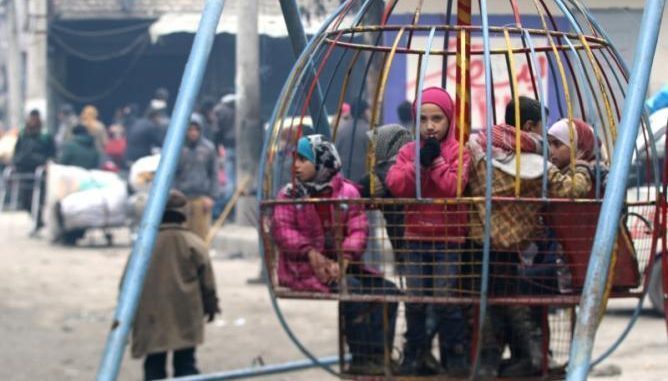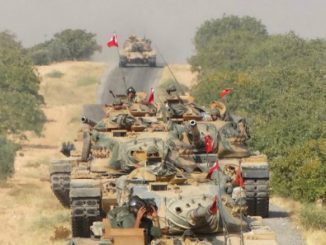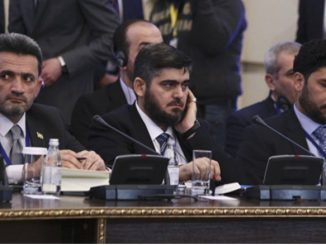
In a new chapter of the humanitarian crisis in Aleppo, the deal to evacuate civilians and rebels from the eastern parts was stopped again on Sunday because militants burnt evacuation buses sent for Shiite civilians in rebel-besieged towns in Idlib.
After months of crippling siege, starvation policy, daily bombardment, fierce clashes and bloody massacres the Assad regime and its allies were able to oblige the rebels in Aleppo to surrender and make an agreement to leave the area they have been holding since 2012 after losing more than 90% of it.
The ceasefire agreement was a result of talks between Russia and Turkey.
As part of an agreement between Turkey and Russia, tens of thousands of rebels and civilians were supposed to be evacuated from eastern Aleppo to rebel-held Idlib, allowing the Assad regime to take full control of the city after years of fighting.
By taking full control of Aleppo, Assad has proved the power of his military coalition, aided by Russia’s air force and an array of Shi’ite militias backed by Iran after his rule was close to ending after major losses in 2015.
Previous failed deals
On Wednesday morning, buses and ambulances were brought to evacuate rebel fighters and their families – only to be turned away shortly afterward as the ceasefire fell apart and the bombardment was resumed again.
However, the bombardment stopped at night and the agreement was resumed to evacuate the rebels and civilians on Thursday.
The civilians evacuation was continued until Friday morning when the convoy was obstructed by Iranian-backed militias again, who refused the agreement and sought to force their conditions on its progress.
Iran was insisting people be allowed to leave two besieged Shi’ite villages before letting the Aleppo evacuation happen.
Four people who were part of a convoy evacuating the besieged districts of east Aleppo were killed by Syrian government forces.
Numerous rebels and east Aleppo residents shared reports and videos of people fleeing the sound of shooting, being detained and returning home badly beaten and robbed of their possessions near a checkpoint as they tried to leave the city on Friday.
The civilians then returned to Aleppo, where the reports say that up to 50,000 people remained stranded there ahead of the evacuation, including about 4,000 fighters and about 10,000 family members of fighters.
Rise and collapse of a new deal
A new deal was reached on Saturday to allow the civilian evacuation on Sunday, in return for evacuation of people from rebel-besieged towns.
Sources in Aleppo said that as part of the latest deal, a total of 4,000 people will evacuate the Shia-majority towns of Fua and Kefraya in Idlib province, which are currently besieged by opposition fighters.
The source said 1,500 people in the government-besieged towns of Madaya and Zabadani as well as everyone in eastern Aleppo will also be allowed to evacuate as part of this deal.
Syrian state media reported that government forces would only allow civilians and fighters to leave eastern Aleppo once families in Fua and Kefraya are evacuated.
After negotiations, agreement finally reached: civilian evacuations should begin in Aleppo, Zabadani, Madaya, Kafraya & Fooa w/in hours.
— هادي العبدالله Hadi (@HadiAlabdallah) December 17, 2016
However, the evacuation efforts collapsed again after armed men burned five buses that were supposed to be used for the evacuation near Idlib on Sunday.
The Syrian Observatory for Human Rights, a Britain-based war monitor, said the evacuation of the villages near Idlib had been postponed as a result of the incident. Five buses leaving Aleppo were held, packed with evacuees, for hours before they could drive the 5 km (3 miles) to rebel-held territory outside.
Videos posted on social media showed bearded men with guns cheering and shouting “God is great” after torching the green buses before they were able to reach the villages.
State media said “armed terrorists”, a term it uses for all groups fighting President Bashar al-Assad, had carried out the attack. Pro-Damascus Mayadeen television and the Observatory blamed the rebel group formerly known as the Nusra Front.
In a statement carried by a military news outlet run by Damascus’s ally, the Lebanese group Hezbollah, the allied forces leadership said responsibility for the delay in the evacuation falls with “terrorists and their state sponsors”.
Rebel officials said an angry crowd of people, possibly alongside pro-government “operatives”, was responsible.
Opposition politicians and activists expressed their rage after what they described as “a reckless and stupid move as every move that Fatah al-Sham does,” reflecting a wide refusal for the group actions that have been harming the Syrian revolution and causing major setbacks for the rebels’ forces.
#Fatih_Sham and Extremists protesters burned buses on the Way to evacuate Kafria-Fowa people
And put #Aleppo people souls in Danger pic.twitter.com/oH8G1psBye— Ahmad Alkhatib (@AhmadAlkhtiib) December 18, 2016
This is the buses were burned by #JFS members and other extremist members, #Aleppo people in Danger
Who did it Traitors and agents of Assad pic.twitter.com/RDn0adLX8p— Ahmad Alkhatib (@AhmadAlkhtiib) December 18, 2016
Waiting in dire conditions
The delay left thousands of people in limbo. Many had been sleeping on the streets and in bombed-out buildings in subfreezing temperatures since Friday, when earlier evacuations were brought to a sudden halt.
Activist Monther Etaky in eastern Aleppo posted a video on Twitter showing dozens of weary and injured people, saying they had been waiting to be evacuated since 6 a.m. “Civilians are not negotiations tool(s),” he wrote in his post.
Many had spent the night sleeping in the streets in freezing temperatures.
“Conditions in eastern Aleppo remain extremely dire,” said a journalist.
“In the evenings it can go to -5C. They have access to very little food, fuel, water and medical supplies. The situation on the ground remains grim as people wait.”
Ismail al-Abdullah, a civilian trapped in east Aleppo, said: “Two injured people waiting for the Red Crescent died while they were waiting to be evacuated, while they were waiting to be treated … we told them many times, ‘You will be evacuated, wait for the ambulances’, but that didn’t happen and they died.”
With others, Abdullah tried to visit the evacuation point on Sunday. “When we saw the number of people, we thought they would be unable to evacuate this number of people so we turned around,” he said.
“We are under siege … we are just surviving now. We are just staying alive.”
The Norwegian Refugee Council is assisting people who have fled eastern Aleppo, many of whom slept outdoors as temperatures plunged below zero. The council is hosting them in camps to the north of the city.
“Our major concern at this point is — not only in Aleppo but across the country, where there are people being displaced by this fighting — is that they’re living in the open, they’re exposed to the elements,” Thomas White, the organization’s Syria Response Director, told CNN’s Cyril Vanier. “And it’s cold right now, and this winter in northern Syria will be a killer.”
But for many, being taken to Idlib is moving from one war zone to another. Idlib is widely expected to be the regime’s next target, and the evacuations are effectively moving rebels to one containable zone.
Woman from #Aleppo send message explain the situation in Aleppo and speck to who burned the buses and stopped the evacuation https://t.co/clQReNYmE9
— Ahmad Alkhatib (@AhmadAlkhtiib) December 18, 2016
Lot of people are waiting in the streets since Friday at the closed unsafe passage, no place to go in the city of death #Aleppo pic.twitter.com/M5AkyxR18q
— Lina shamy (@Linashamy) December 18, 2016
It's not the Judgment day, Those thousands of people waiting to be evacuated from #Aleppo#standwithaleppo pic.twitter.com/INnn9Mc6xn
— Ahmad Alkhatib (@AhmadAlkhtiib) December 18, 2016
The Iranian-backed Shi’ite militias have played a leading role in the siege of rebel-held Aleppo and in the Syrian army’s retaking of near full control of the city, and will not leave a “victory” like this be passed without using it to achieve their goals and changing the city’s face and increase their dominance.
“Russia has failed to restrain the sectarian Shi’ite militias in Aleppo to complete the deal and Moscow should abide by its commitments,” Sayal said.
“There are still civilians in Aleppo who need to be evacuated in harsh weather conditions and Russian statements that besieged Aleppo is empty is absolving itself from following up on the agreement,” he added.
“It’s clear the Iranians have a different opinion here … I think they believe that they are winning and must finish off the opposition, rather than allow them to leave the city alive. The Syrian regime seems to be closer to the Iranian position,” an analyst said.
The fate of rebel-held Aleppo spells the abject failure of the west’s contradictory and piecemeal policies. It is a humiliation for the UN. Its fall will be an unequivocal victory for Russian strategy, and the shameful and humiliating defeat for all those who said they stand with the civilians and left them to face annihilation including US, Turkey and all Arab states.
????
Left: Moshe Dayan in #Alquds 1967.
Right: #Soleimani in #Aleppo 2016. @khamenei_ir regime will pay the price. Invaders always do ?? pic.twitter.com/Iw8nVsTm5A— Dr. Ali Bakeer (@AliBakeer) December 17, 2016




